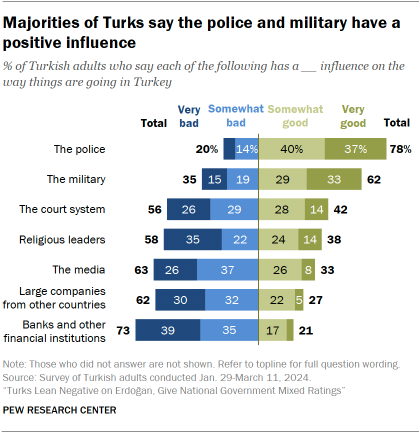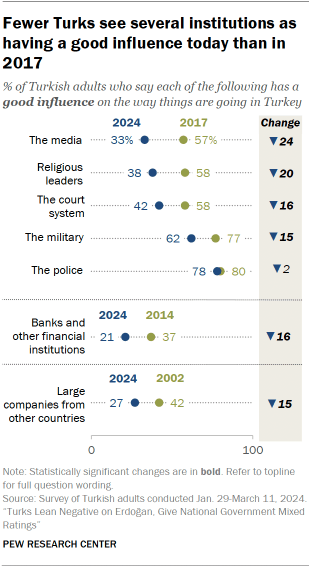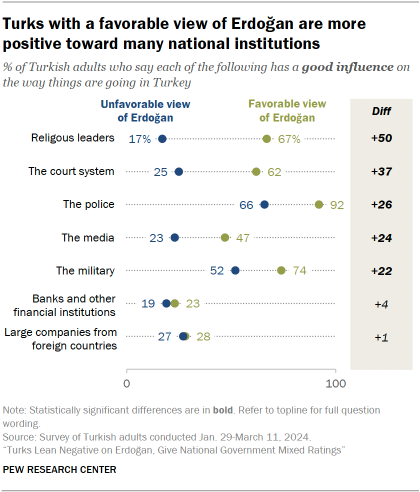Turkish adults see various conflicts among different groups in their society. Majorities say there are conflicts between people who support different political parties (77%) and between people with different ethnic backgrounds (59%).
Opinions are more mixed in the majority-Muslim nation when it comes to conflicts between people who practice different religions, with 47% saying there are strong religious conflicts and 51% saying there are generally not. Notably, Turkish Muslims who pray less than weekly are somewhat more likely than those who pray five salah daily to say there are conflicts between people of different religions.
Fewer see conflicts between people who live in cities and people who live in rural areas. Only about a quarter of Turkish adults (26%) say there are strong conflicts of this nature.
Turkish adults with lower incomes are more likely than those with higher incomes to say there are strong urban-rural conflicts in Turkey (+22 points, though higher-income adults were less likely to respond to the question). Those with lower incomes are also more likely to see strong religious conflicts (+18) and ethnic conflicts (+13).
Turkish adults who hold a favorable opinion of Erdoğan are less likely than Turks with an unfavorable view of the president to report strong religious (-12), political (-11) and ethnic (-9) conflicts in their society.
Views of institutions
Majorities of Turkish adults say the police (78%) and the military (62%) have a good influence in the country, making these the only two institutions or organizations we asked about that at least half of the public sees positively.

Most Turks say the court system, religious leaders and the media (including television, newspapers and magazines) have a bad influence in the country. About a quarter or more, in fact, say the influence of each of these is very bad.
Large companies from other countries, as well as banks and other financial institutions, get the most negative ratings. For example, around three-quarters of Turks (73%) say banks have a bad influence on the country.
Related: 83% of Turks say their country’s current economic situation is bad
Views over time

We last asked about many of these institutions in 2017. Compared with seven years ago, fewer Turks now believe the media (-24 points), religious leaders (-20), the court system (-16) and the military (-15) have a good influence in Turkey.
Political and demographic differences

Turkish adults who have a positive view of Erdoğan are more likely than those with an unfavorable view of him to say various institutions have a good influence in the country. For example, those who think positively of Erdoğan are 50 points more likely than those with an unfavorable view of the president to say that religious leaders have a good influence in Turkey (67% vs. 17%).
Erdoğan supporters are also more likely than nonsupporters to have a positive view of the influence of the court system, the police, the media and the military.
On the other hand, Turks who have a favorable opinion of former opposition leader Kemal Kılıçdaroğlu – Erdoğan’s opponent in the May 2023 presidential election – see a number of institutions differently. For instance, Kilicdaroglu supporters are 31 points less likely than those who see him unfavorably to say that religious leaders have a good influence in the country. They are also less likely to have a positive view of the influence of the court system (-15 points) and the police (-9).
There are no significant differences between Erdoğan or Kılıçdaroğlu supporters when it comes to the influence of banks and foreign companies, but there are differences by age. Turkish adults under 35 are more likely than those ages 50 and older to say that large companies from other countries (35% vs. 23%) and banks and other financial institutions (26% vs. 17%) have a positive influence in Turkey.
